Letter from the Middle East: Buyers call for more
Western countries want Mideast Gulf producers to boost output, but the options are limited
Russia’s invasion of Ukraine has put many Middle Eastern countries in a tricky position politically, but it has reinforced their centrality to the global energy economy. Mideast Gulf countries complain that Western leaders only visit when they need them. They bemoan a lack of support over attacks on energy infrastructure emanating from the Houthi forces in Yemen, and the Biden administration’s pursuit of a renewed deal with Iran. As the only two Opec+ members with substantial spare oil production capacity, Saudi Arabia and the UAE have been implored by the US, Germany and the UK to raise output. Both are engaged in multi-year expansion programmes. Riyadh responded coldly that it would not be

Also in this section
26 July 2024
Oil majors play it safe amid unfavourable terms in latest oil and gas licensing bid rounds allowing Chinese low-ball moves
25 July 2024
Despite huge efforts by India’s government to accelerate crude production, India’s dependency shows no sign of easing
24 July 2024
Diesel and jet fuel supplies face a timebomb in just four years, and even gasoline may not be immune
23 July 2024
Rosneft’s Arctic megaproject is happening despite sanctions, a lack of foreign investment and OPEC+ restrictions. But it will take a long time for its colossal potential to be realised







